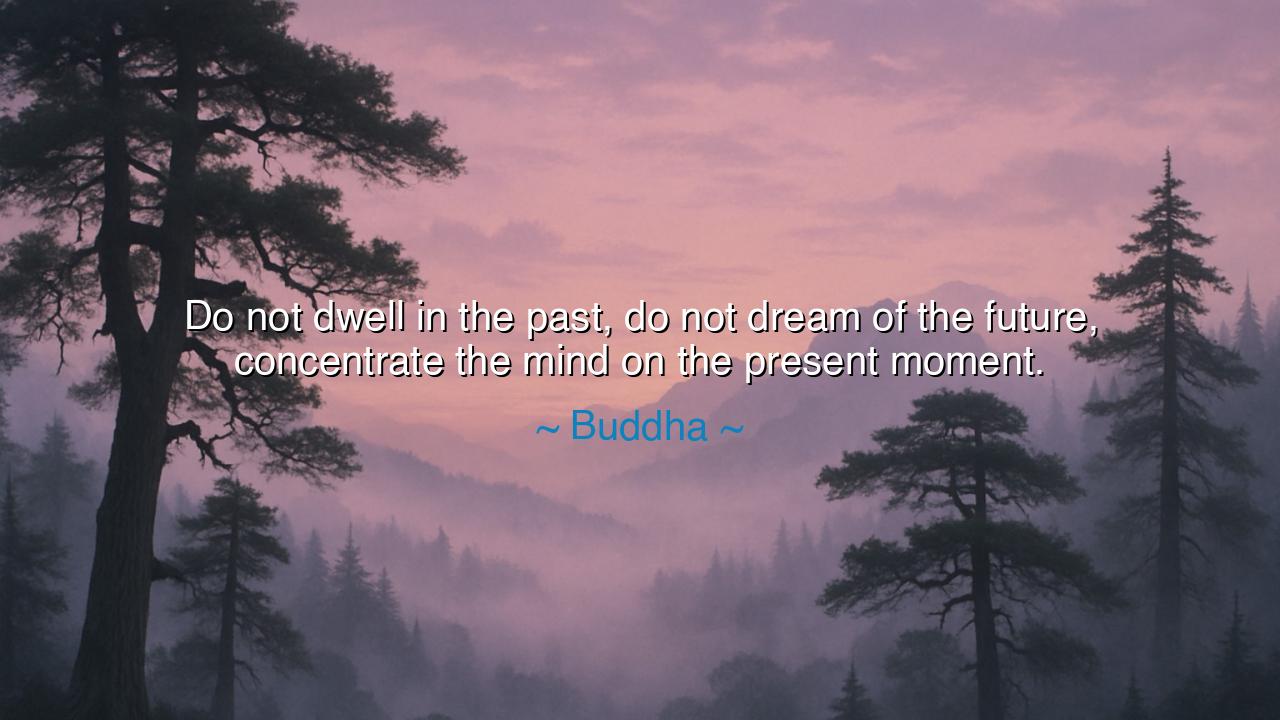
Do not dwell in the past, do not dream of the future, concentrate
Do not dwell in the past, do not dream of the future, concentrate the mind on the present moment.






When Buddha proclaimed, “Do not dwell in the past, do not dream of the future, concentrate the mind on the present moment,” he imparted wisdom that echoes through the ages, a wisdom that speaks not just of philosophy, but of peace. In these words, Buddha calls us to a state of mindfulness, urging us to let go of the weight of regret for what has been and the anxiety for what may come. He teaches that true peace and contentment can only be found by focusing our attention on the present moment—the only moment that truly exists.
The ancients understood the weight of time. Heraclitus, the Greek philosopher, spoke of the ever-changing nature of life: “You cannot step into the same river twice.” Life is always flowing forward, and yet, many of us hold onto the past like a burden, fearing what might slip away or what could have been. Buddha’s words, however, are a call to release the past’s hold over us, recognizing that the present moment is where we can truly act, where we can find clarity, growth, and understanding. When we focus on the past, we find ourselves imprisoned by what we cannot change, and when we dream of the future, we lose the power of what we can create now.
The story of Alexander the Great provides a vivid example of the danger of focusing too much on the future. A conqueror of nations, Alexander was driven by an ambition to build an empire that would span the world. But despite his many victories, he could never truly enjoy the present moment, for he was always focused on the next conquest. Even when he achieved what many would consider the height of success, he was dissatisfied. His focus on an endless horizon, always chasing the future, led him to overlook the gifts and lessons of the present. It was only near the end of his life, as his empire began to crumble, that he realized he had spent so much time seeking the next goal, that he had lost the joy of living in the present. Alexander’s story serves as a reminder that if we fail to focus on the now, we risk losing our chance to truly live.
The ancient Stoics shared a similar understanding of time. Marcus Aurelius, the Roman emperor and philosopher, frequently meditated on the transient nature of life and the importance of focusing on the present. In his work, Meditations, he wrote: “You have power over your mind, not outside events. Realize this, and you will find strength.” Like Buddha, Marcus understood that while we cannot control the past or predict the future, we can choose how we engage with the present moment. The Stoics saw that it was only by concentrating on the present—by accepting the world as it is and responding with rationality and virtue—that we can find peace and purpose in an uncertain world.
Buddha’s teaching about the present moment speaks to the profound power of mindfulness. Consider the act of meditation, a practice that has been central to spiritual traditions across the world for thousands of years. When we meditate, we consciously bring our attention back to the present, observing our thoughts without judgment, letting go of the pull of the past and the future. It is in this act of focusing on the now that we find true clarity. As we learn to still our minds, we uncover the power of the present. Buddha knew that it is in this stillness that we can find our truest selves, unburdened by the weight of time.
The deeper lesson of Buddha’s teaching is one of balance. To dwell on the past is to be imprisoned by what cannot be undone. To dream of the future is to be pulled away from the power of today. The present, however, is the place where we hold the most potential. It is the only time we have control over, and it is through concentration on the present that we can find meaning in the smallest of moments. Whether in our work, our relationships, or our inner peace, the present moment holds the key to living fully.
So, let us heed the words of Buddha. In our fast-paced, ever-moving world, it is all too easy to get swept away by the tides of regret and anticipation. But by focusing on the present, we can find peace, and in that peace, we can create the future we desire. The present is a gift, a chance to live with intention, to act with clarity, and to experience life as it unfolds. By practicing mindfulness, by grounding ourselves in the here and now, we can unlock the full potential of our lives. Take a moment today, in the midst of your busy world, to simply breathe, to feel the pulse of life, and to live fully in the moment, for it is the only one you can truly claim.






AAdministratorAdministrator
Welcome, honored guests. Please leave a comment, we will respond soon